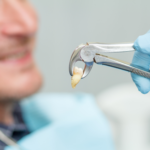ooth cavities. No one enjoys them, and that sharp pain is definitely unwelcome. But before you spiral into a dental appointment dread zone, let’s take a breath and explore how to manage a cavity.
First Things First: Schedule a Dentist Appointment
This might seem obvious, but it’s crucial. A dentist can accurately assess the cavity’s severity and recommend the best course of treatment. Early intervention is key! The sooner you address the cavity, the easier and more affordable the treatment will likely be.
Living with a Cavity Until Your Appointment
While you wait for your dentist visit, there are steps you can take to manage the discomfort and prevent further damage:
- Pain Relief: Over-the-counter pain relievers like ibuprofen or acetaminophen can help manage any toothache.
- Gentle Brushing: Brushing twice a day with a soft-bristled brush and fluoride toothpaste is essential. Be gentle around the cavity, but don’t neglect it completely.
- Flossing Matters: Flossing removes food particles and plaque that can irritate the cavity.
- Diet Watch: Sugary and acidic foods can worsen the cavity. Opt for water instead of sugary drinks and limit sugary snacks.
- Sensitivity Soothers: If you experience sensitivity to hot or cold, use lukewarm water and toothpaste designed for sensitive teeth.
What to Expect at the Dentist
Depending on the severity of the cavity, your dentist might recommend:
- Fluoride Treatment: In very early stages, a concentrated fluoride treatment can sometimes reverse the decay and strengthen the enamel.
- Fillings: This is the most common treatment for cavities. The dentist removes the decayed portion and fills the cavity with a composite resin.
- Root Canal: In advanced cases, the cavity might reach the inner pulp of the tooth. A root canal is needed to remove the infected pulp and save the tooth.
- Extraction: In very rare cases, a severely damaged tooth might need extraction.
Remember, Prevention is Key
While cavities happen, there’s a lot you can do to prevent them:
- Brushing and Flossing: Brushing twice a day and flossing daily are the cornerstones of good oral hygiene.
- Fluoride Power: Use fluoridated toothpaste and consider a fluoride mouthwash for extra protection.
- Diet Choices: Limit sugary foods and drinks, and rinse your mouth with water after meals.
- Regular Checkups: Schedule regular dental checkups and cleanings for professional monitoring and early cavity detection.
Cavities are a drag, but with proper management and a focus on prevention, you can keep your smile healthy and bright.








